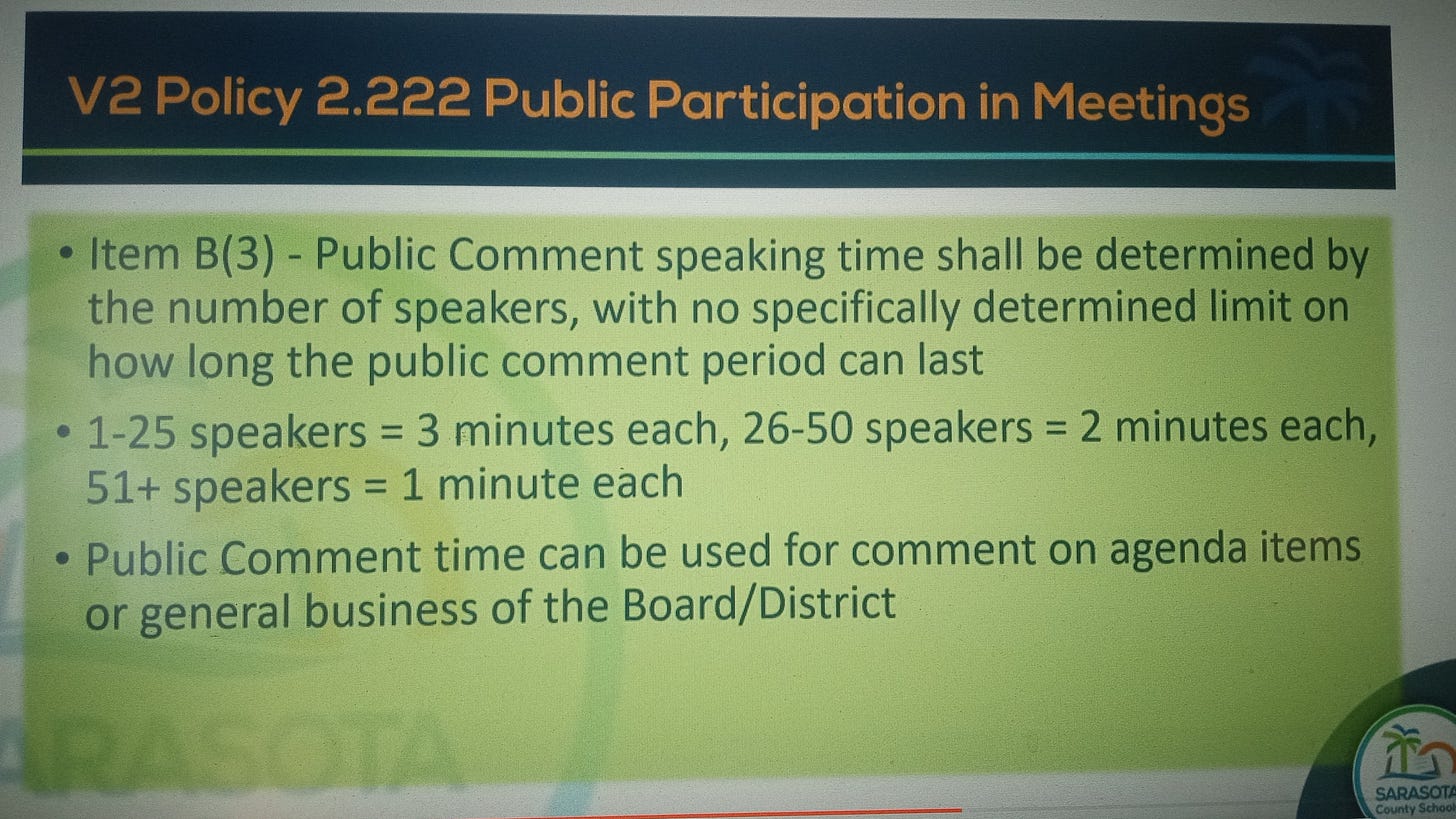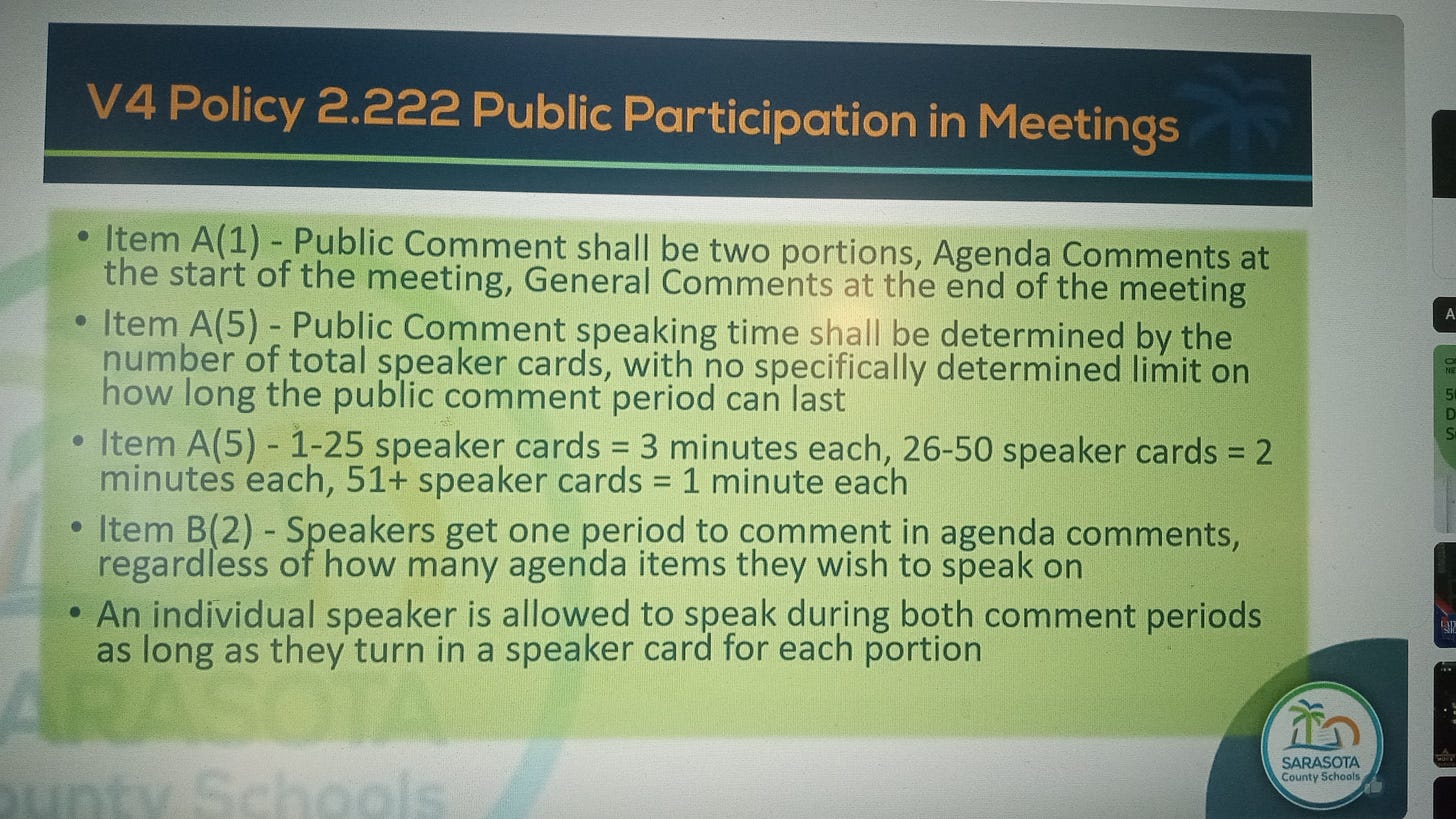It wouldn’t be a Sarasota (Florida) School Board Meeting or Workshop without irony as thick as the whipped cream on a Yoder’s dessert. But let me tell you, this one takes the cake.
The workshop that took place on March 19th covered two important topics: Work Force Housing (affordable housing for teachers / staff (and) ; Discussions of shortening the length of time on public comments.
As a point of reference, the discussion on changing public comment time started in the meeting at 2:28:31 and ended at approximately 3:48:37. Let’s do the math.
If this segment was 1 hour, twenty minutes, then I calculate that between the five school board members and the attorney, each person had twenty minutes each to discuss the three options offered to them.
The first option is to keep things the same.
The Second:
The third:
Robyn Marinelli emphasized the advice she got in school. “Every teacher and professor that I had, told us that if you can’t say what needs to be said in a minute, then it’s too long.”
Describing herself as a simple person, she later said, “I’m an efficient person.” However, she didn’t make her point in a minute. Nor did she make it in one minute and 30 seconds or even three minutes.
Attempting to make every word count - and count again and again, Chair Karen Rose couldn’t seem to stop repeating herself. Attendees of the meetings know that she will always start out with: “I had been a principal for 14 years. . .”
Rose said she takes responsibility as Chair to run productive school board meetings, but the workshop during this portion was anything but constructive. Rose appeared to be practicing her campaign speech by stating: “I’ve been out in the community and I get constant feedback,” she said. “The public is asking me constantly for change”.
Is she hearing the feedback from the people who attend the meetings and get beeped, their microphones cut off because they couldn’t finish their speeches within three minutes?
“Business of the baord is the last on the agenda - not acceptable to me.”
Citing the importance of the meeting and comments being based on the agenda items students / academic achievements, teachers and staff, Rose continued. She discussed organizations outside of Sarasota coming to speak at the meetings, with people commenting having organized political motives. Need we even go to her nominating her own campaign treasurer to an administrative position? Tom Edwards said he wanted to give everyone ample time to talk, before he took his turn.
Directing a calm tone towards Rose, he pointed out that the reason for the large turnout of speakers was because the agenda items were not based in academia, the best interest of students and staff and the business of the board.
“Character Strong, redistricting, Vermilion,” he pointed out, as evidence of the problem being at her own hand. What she stated she didn’t want happening at the meetings, was the direct result of her actions.
Edwards continued: “This is what gets a public response. It’s not their (the speaker’s fault). They shouldn’t be shamed.”
“Speakers should have a meaningful opportunity to participate before voting takes place.”
The elephant in the room was that many speakers come to the meetings asking for Bridget Ziegler’s resignation. There was no mention of that, and as a result, Ziegler confidently added her voice, which was anything but clear. “No one wants to limit public speaking,” she started. “Traditionally, separate the two. . practicing with fidelity.”
To attempt to understand Ziegler’s confusing word gumbo, I looked up the word, fidelity. It read:
“the quality or state of being faithful or loyal. especially : loyalty to one's spouse in refraining from adultery and sometimes in submitting to a spouse's reasonable sexual desires.”
The Board Attorney Patrick Duggan, and Board Member Tim Enos stayed on the track of the First Amendment.
Duggan emphasized that it takes more than one minute for a person to speak, especially if they have “entirely different perspectives.”
He continued: “Speakers should have a meaningful opportunity to participate before voting takes place.”
Enos also brought up the use of signs during public comment. While taking pride in being a First Amendment Rights Advocate throughout his career, he spoke of concerns regarding “hate groups or disruptive groups” with signs being extended the same grace.
In the School board regulations, signs are allowed, as long as they don’t block the view of others. Marinelli said it was brought to her attention by the community that it does block the view and is a “measurable distraction”.
Rose also believes “signs block others’ views”. Later, she dismissed the idea.
Ziegler stated “It is not an infringement to remove signs.”
Possibly the only person who accomplished the goal of speaking less than three minutes was Superintendent Terry Connor. Responding directly to the public’s question, he wanted to know what the time frame was for speakers to turn in their cards.
Enos added that there had to be consistency in filling out the cards - stating that he often saw duplicates. Enos repeatedly requested consistency as a way to be “fair to everybody”.
Rose expressed annoyance that a public records request was made for speaker’s cards. This wasn’t the only time she showed disdain, as she mocked certain speakers commenting: “Nothing is more important than students. Fine - go to the polls. . .Stellar things I support that all the way.”
Rose also dismissed the criticism that called her out for thanking a person by name (or not) at the end of the speaker comments.
As she does at the meetings, Ziegler showed compassion for the staff, who stay late for the meetings, dog-whistling blame at the speakers. “At least I see you can still get work done,” she said and laughed.
If Ziegler resigned - based on the same words she used towards former Superintendent Todd Bowden - then perhaps 50% less speakers would show up. Zander Moricz could go back to Harvard and finish his studies, instead of attending school board meetings.
Of Bowden, she wrote that he was focused “on his own self-preservation, rather than the organization, outcomes and results. This type of leadership has a devastating impact on the culture, morale and overall climate of the school board.”
She spoke of his ‘lack of personal ownership and accountability. . .” Ironically, Ziegler still sits on the board but doesn’t eat her own words.
There was no consensus among the board members as to new time constraints for speakers.
Edwards believed that Agenda items (based on speaker cards) should get three minutes before the vote. After votes were taken, then general comments could be heard. He believes that those speakers should get two to three minutes for the general comments.
Enos also believed in dividing the time.
Marinelli expressing sincere sentiment, said: “I do want to hear from the public, but. . .”
Ziegler spoke of speeches being “weaponized” and then said “maybe that’s not the right word”. “No one wants to limit public speaking,” she said. At the last board meeting, she said it hurts her stomach to think of limiting speaker’s speech time. Yet, she seemed to like Tallahassee’s policy of one minute for each speaker. “But I know we can’t do that.” She seemed to like the idea of splitting the time so “the staff can go home”.
There was one blip during the meeting when Marinelli seemed to criticize former board member Jane Goodwin and how the speaker’s comments were handled then. She wanted to give a vantage point from being in the audience, before she was elected to the board. Off mike, Edwards appeared to defend the process, with Marinelli sharply admonishing him: “I’m not finished yet. Please. Thank you.”
However, in a conciliatory tone and looking at Edwards, she smiled and said: “At least this is something we can all agree on,” when they agreed that business of the board should come first at the meetings.
Her concluding sentence was a cautionary warning and accountability for all the members: “We set the tone of the meetings.”
On the School Board YouTube Video page, Support Our Schools Lisa Schurr concurred with Edwards that the narrative shouldn’t be changed as to what Ziegler, Enos and Marinelli campaigned on.
“Remember that this board changed the timing allowing three minutes for all speakers, regardless of whether it was an agenda or non-agenda item that was being discussed, shortly after Ziegler, Enos, and Marinelli were sworn into office in 2022.” she wrote. “So it was this very same board that changed the restrictive policy BACK to the three minutes per person, regardless of the content of the comments (agenda vs nonagenda items).
Answering Rose’s repeated coda, Edwards concluded by expressing, “I can’t imagine any one of us going through the hard work of running for office and not being student focused.”
In the Next Dear Bubbie: Takeaways and snark on limiting speaking time for school board audience members; Followed by Workforce Housing for Teachers and Staff, as well as a stunning request from Ziegler, as commentary on the March 19th School Board Workshop resumes.







Once again you both inform me and give me a chuckle. All during that discussion?? re/public comments I kept thinking perhaps we should limit the time of the board members. Rambling, repeating and just plain old word salad permeates the board's discussion.
In case nobody read the agenda, public comment is not on it.